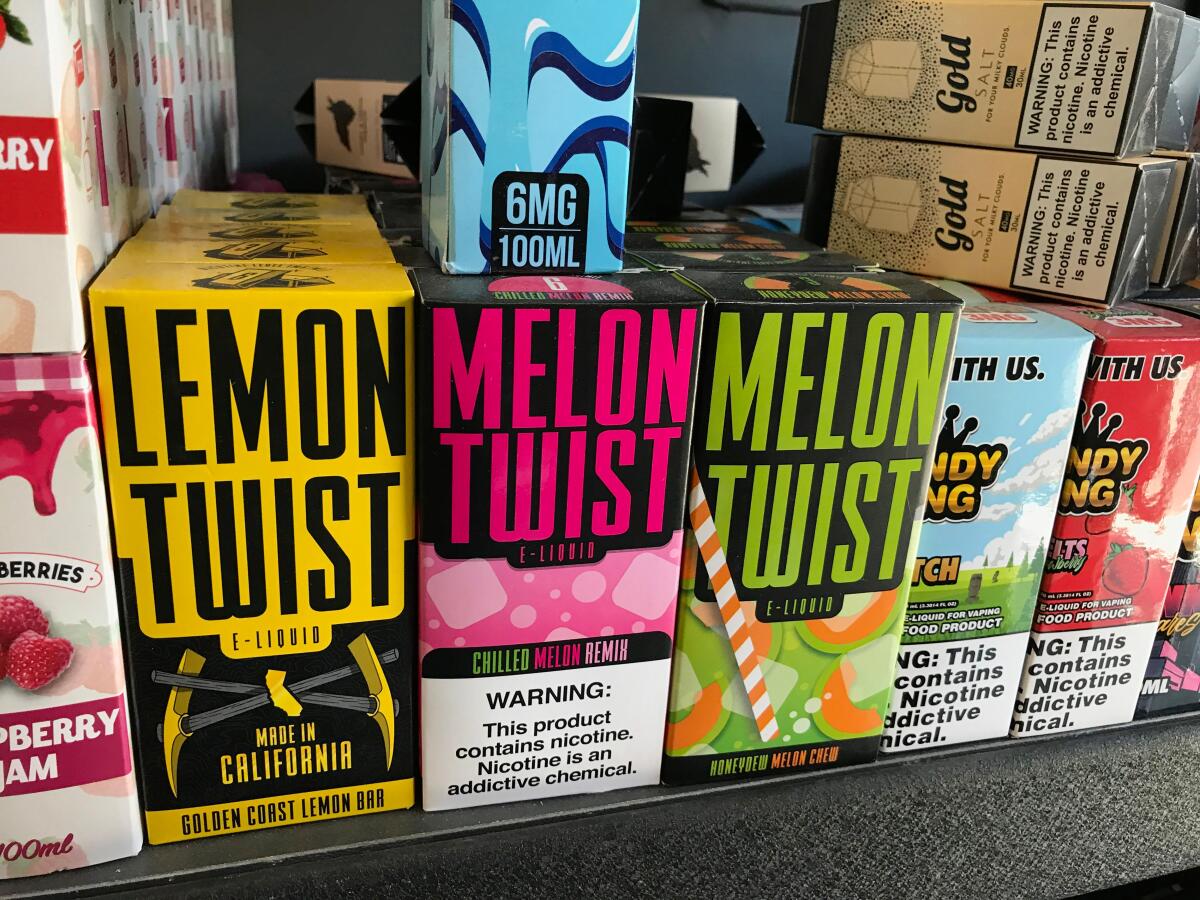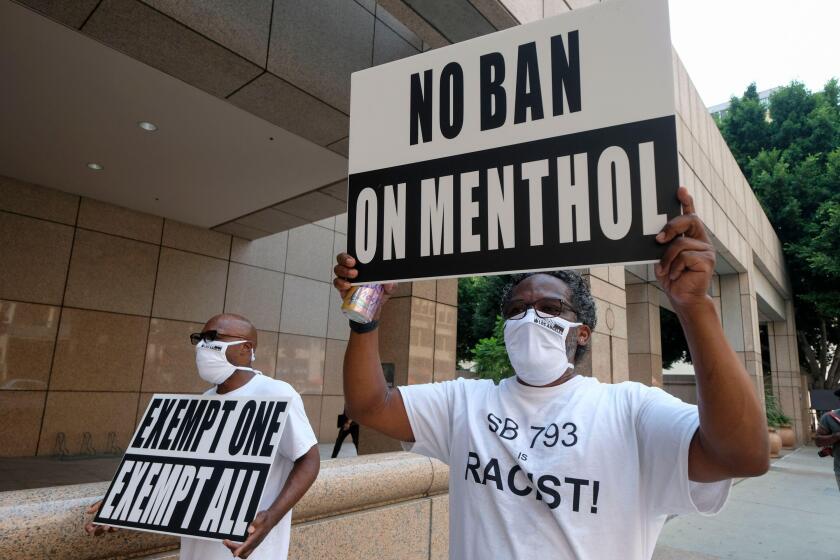Los Angeles will clamp down on selling flavored tobacco products

- Share via
Los Angeles will ban many businesses from selling tobacco products that come in sweet, spicy and minty flavors under new restrictions backed Wednesday by the City Council.
The new rules were celebrated by public health advocates and community groups that argue that tobacco products with appealing flavors — including menthol cigarettes, flavored cigars and liquid pods for electronic cigarettes — have been a gateway to nicotine addiction for teens. Researchers have found that the majority of youth who use tobacco started with flavored products.
“It’s a simple formula: Use flavors that appeal to kids to cover up the harsh flavors of traditional tobacco, disguise the strong hits of addictive nicotine and hook a new generation of tobacco users — and then just watch the profits roll in,” said Lindsey Freitas, advocacy director for the Campaign for Tobacco-Free Kids.
Council members voted 12 to 0 to pass the ordinance, which now goes to Mayor Eric Garcetti for his signature. “We have a duty to protect our youngest and most vulnerable residents against the lifelong, deadly impacts of tobacco in this city,” said Councilman Mitch O’Farrell, who initiated the proposal at City Hall.
The new restrictions are slated to go into effect in January. Ahead of the Wednesday vote, a representative of the National Assn. of Tobacco Outlets thanked the council for giving retailers time to sell their products and “adapt to the new regulations.”
In more than three years since restrictions on flavored tobacco were first proposed at City Hall, much of the debate revolved not around whether to pass such a ban, but which products and sellers should fall under it.
A joint investigation has learned that Newport cigarette maker Reynolds American has hired Black lobbyists and influenced grass-roots groups to help fan fears among Black communities about menthol bans.
The new rules exempt the sale of shisha tobacco at hookah lounges and bar patios that got their tobacco retailer permits before January. Hookah sellers had protested outside City Hall for such an exemption, arguing it was needed to protect a tradition cherished by Arabs, Armenians and other communities in Los Angeles.
Another set of protesters had rallied at City Hall to push for an exemption for menthol cigarettes, arguing that it was unfair to ban a product disproportionately used by Black consumers. A Times investigation into menthol lobbying efforts found that L.A. protesters were paid to attend that rally, which was organized by a group with close ties to Reynolds American, the biggest manufacturer of menthols in the United States.
Council members ultimately resisted calls to exempt menthols, citing their harmful effect on the health of Black communities. Menthol, a minty compound that masks the harshness of tobacco, has been found to be harder to quit than conventional cigarettes.
“It would have been extremely disappointing if we had said, ‘We’re going to protect people and children from uptake of tobacco — except for the flavor that we know Black people first, and Latinos second, use the most,’” said Councilman Marqueece Harris-Dawson, calling the Wednesday vote “a victory for racial justice.”
Tobacco companies had lobbied the city against broadly banning flavored products, arguing that doing so would have unintended consequences such as increasing teen use of conventional cigarettes.
Although “these bans are primarily driven by parental concerns over one particular product, the bans themselves cover a much broader range of products, including some that involve neither vape nor tobacco, such as those that use pharmaceutical grade nicotine,” Sandy Fowler-Jones, a spokesperson for the tobacco company Swedish Match, said in an e-mailed statement. “It is also important to consider the fact that many smokers use flavors to transition away from cigarettes — and by extension, tobacco — altogether.”
If such health implications are not considered, “the ban may inadvertently do more harm than good,” Fowler-Jones said.
Get the lowdown on L.A. politics
Sign up for our L.A. City Hall newsletter to get weekly insights, scoops and analysis.
You may occasionally receive promotional content from the Los Angeles Times.
Backers of the ban have disputed the findings of a key study cited by opponents about cigarette smoking among high schoolers after San Francisco banned flavored products, saying that it arrived at a premature conclusion about youth switching to cigarettes because it relied on surveys that reflected “incomplete implementation” of the San Francisco ban.
L.A., now the biggest city in the state to adopt such a ban, follows scores of other California cities and counties that have passed similar prohibitions on the local level. California lawmakers had also backed a statewide law restricting the sale of flavored tobacco products, but that law was put on hold after a state referendum backed by the tobacco industry qualified for the November ballot.
If California voters decide to repeal the statewide ban, the local rules will still stand in Los Angeles and other municipalities that have imposed them, according to flavored tobacco opponents. The Food and Drug Administration has also unveiled a plan to ban menthol cigarettes and flavored cigars on the national level, a move that is not expected to be finalized before next year.
More to Read
Sign up for Essential California
The most important California stories and recommendations in your inbox every morning.
You may occasionally receive promotional content from the Los Angeles Times.












